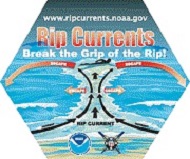Beaches
Florida Department of Health in St. Johns County Environmental Public Health Program
- 904-506-6081
- SJCHD.EH@flhealth.gov
-
Fax
904-428-5659 -
Mailing Address
200 San Sebastian View
St. Augustine, FL, 32084
National Weather Service – Rip Current Safety
Healthy Swimming and Recreation
Florida Fish and Wildlife Conservation Commission, 800-636-0511
At the beach, know when to
Swim It, Shore It, Dodge It
The Florida Department of Health in St. Johns County's Environmental Public Health Service Center conducts beach water sampling at several beach locations. Beach water is routinely analyzed for levels of the enteric bacterial indicator Enterococci.
Test results are provided on total bacteria counts that are detected only through laboratory analysis, and rated “Poor,” “Moderate,” or “Good.”
During instances when testing identifies poor water quality, a warning and/or advisory sign is posted at the specific beach location and a public service announcement is issued.
Program Overview
In 1998, five of Florida's coastal counties began monitoring for enterococci bacteria under a grant-funded pilot program. By the beginning of 2000, 11 Florida counties were participating in the program, which continued through July 2000.
In August 2000, the Beach Water Sampling Program was extended to 30 coastal counties through Florida legislation and funding. Sampling under the program include fecal coliform as well as enterococci bacteria. In August 2002, the beach water sampling program also began collecting water samples on a weekly basis with additional funding from U.S. Environmental Protection Agency (EPA).
Changes to funding levels in 2011 resulted in a return to bi-weekly sampling, the elimination of all fecal coliform sampling, and a reduction of the number of sample locations. Since enterococcus bacteria are indicators of the same types of pollution as fecal coliform bacteria, this did not affect the safety of Florida residents. At this time sampling in the northern parts of the state was also suspended during the winter months, November through February.
Health Impacts
Enterococci are enteric bacteria that normally inhabit the intestinal tract of humans and animals. The presence of enteric bacteria can be an indication of fecal pollution, which may come from stormwater runoff, pets and wildlife, and human sewage. If they are present in high concentrations in recreational waters and are ingested while swimming or enter the skin through a cut or sore, they may cause human disease, infections, or rashes.
The statewide testing program tests for enterococci. According to studies conducted by the EPA, enterococci have a greater correlation with swimming-associated gastrointestinal illness in both marine and fresh waters than other bacterial indicator organisms, and are less likely to "die off" in saltwater. If an enterococci result were observed to exceed 70 colony forming units per 100 milliliters of beach water sampled and a resampling result also exceeds this value, then an "Advisory" would be issued for the sampling site.
Florida Healthy Beaches Program Categories
- Good = 0-35 Enterococci per 100 milliliters of marine water
- Moderate = 36-70 Enterococci per 100 milliliters of marine water
- Poor = 71 or greater Enterococci per 100 milliliters of marine water
Contact
Fecal indicator bacteria are monitored routinely. The results and any advisories are posted on the individual county pages. Florida will continue to monitor the situation and will take appropriate measures to protect the health of residents and visitors if conditions change.
You can view more information on algal blooms (both red tide and blue-green algae) or Vibrio vulnificus below.
Contact the Public Beach Water Program
- AskEH@FLhealth.gov
- 850-245-4240
- 4052 Bald Cypress Way, Bin A-08, Tallahassee, FL 32399-1710





Connect with DOH